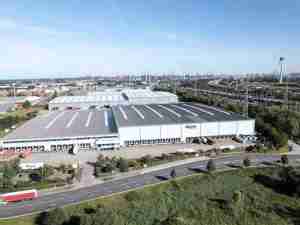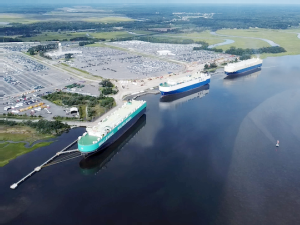Hans Smits, Port of Rotterdam Authority CEO: “We believe that the bottom of the cycle has been reached. In the second half of the year, I expect throughput to stabilize, bringing the shrinkage for the year as a whole to approximately -12%. In 2010, Rotterdam will then be able to benefit from the predicted, modest increase in world trade and contribute towards the recovery of growth in the Dutch economy. Despite the slump, our market share is actually increasing quite clearly. Investment appears to be paying off. That is why we are now benefiting from the strong movements in trade in crude oil and oil products. On the Maasvlakte, the container sector can push down costs through increases in scale and concentration. The Port Authority will therefore continue to invest in the current port area and Maasvlakte 2.”
DRY BULK
The total quantity of dry bulk fell by 38% to 29 million tons. Throughput figures for agribulk (grains, seeds, animal feed ingredients) were down by 1 million tons, due to the good harvest in Europe. This is one million tons below the ‘normal’ level, given an average European harvest. Demand for agribulk is less sensitive to the economic situation.
Coal throughput was 2 million tons down (-14% to 12 million). In the first quarter, there was still considerable demand for energy coal. This started to decline in March and people ate into stocks. The handling of cokes coal fell sharply, due to the decline in demand from the steel industry. In the second half of the year, demand for cokes coal is expected to increase slightly. Throughput figures for ores and scrap plummeted by 60%, to over 8 million tons. In Germany, six of the fifteen blast furnaces were closed. It is likely that steel production there will be increased slightly in the coming months. They want to supplement stocks and demand from the United States is also rising. Other dry bulk (mainly minerals for the production of glass, paper, steel and chemicals) took quite a fall, down 28% to 4 million tons. Despite further deterioration in the sub-markets, total throughput of minerals will be stable for the coming months, ending at 8-9 million tons.
LIQUID BULK
The total result for liquid bulk remained more or less unchanged (-0.5%) at 99 million tons. Imports of crude oil fell by four percent to 49 million tons. This is a better result than one would expect on the basis of the economic trend. In the early months, there was a lot of speculation, however, including temporary storage in tankers. Alongside this, demand for oil products remains high and refinery capacity in other parts of Europe has been closed down. These factors are keeping demand high, at around 50 million tons. There was a sharp increase in the transshipment of mineral oil products, by 17%, to over 35 million tons. Speculation plays a role, in addition to structural factors such as the trading of regional surpluses and shortages, and blending for an increasing variety of specifications. Due to the considerable capacity in terms of storage (tanks) and transshipment (jetties, buoys, posts) and depth, Rotterdam is an ideal hub for fuel oil, gas oil (diesel), kerosene and petrol. Other liquid bulk was 20% down, to over 14 million tons. This was largely attributab









